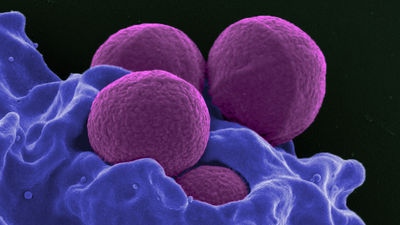WHO warns that treatment of one of sexually transmitted diseases "gonorrhea" is becoming impossible due to "super gonorrhea"

ByJohn Voo
In recent years, many bacteria called "Super Bug" having strong resistance to antibiotics have been reported,GonorrheaA super bug has also appeared in Neisseria gonorrhoea causing it, and it spreads all over the world. WHO revised the guidelines newly for this "super gonorrhea" as antibiotics currently used for treatment do not produce efficacy.
WHO | Growing antibiotic resistance forces to recommended treatment for sexually transmitted infections
http://www.who.int/mediacentre/news/releases/2016/antibiotics-sexual-infections/en/
Gonorrhea Is Becoming Untreatable, U.N. Health Officials Warn: The Two-Way: NPR
http://www.npr.org/sections/thetwo-way/2016/08/30/491969011/u-n-health-officials-warn-gonorrhea-is-becoming-untreatable
A number of reports on super bugs have been reported in recent years, and in June 2016, "There is an epidemic that antibiotics are ineffective by 2050, and 10 million people per year (1 in 3 seconds It may damage 100 trillion dollars (1,000 trillion yen) to the world economy by causing death to a level of death "by the British government.
Shocking report that Super Bacteria might kill one person every 3 seconds in 2050 - GIGAZINE

Such super-bugs also exist in Neisseria gonorrhoeae which is a pathogen of gonorrhea which is one of venereal inflammatory diseases of women and sexually transmitted diseases causing extra-uterine pregnancy. Gonococcus with strong resistance to antibiotics will be released in 2011Since infectious cases were reported in JapanIn 2015, "Super gonorrhea" which is strongly resistant to antibiotics in the UK is spreading rapidly, soonThere is a possibility that it can not be controlled"The content was reported.
And, newly, the quinolone antibiotic that was used from the beginning of the 1990s by the World Health Organization (WHO) on August 30, 2016 (Wednesday, 2016) is tolerant to quinolone antibiotics that are spreading to the world any longer We revised the guidelines as not recommended for Neisseria gonorrhoeae. Instead of quinolone antibiotics, WHO recommends antibiotics called cephalosporins.
Gonorrhea is an epidemic that has been afflicting humankind for hundreds of years, but since penicillin was discovered, the treatment has advanced significantly. However, it is a gonorrhea that could once be treated with common antibiotics such as penicillin, ampicillin, tetracycline, and doxycycline, but after gonococci became resistant to antibiotics, Antibiotics also lost effect. Professor Jonathan Zenilmann who studies infectious diseases at Johns Hopkins University said, "If this was a human being, it would be an incredibly creative person, and this bacterium is a formidable ability to adapt to drugs and tolerance The mechanism of the development has been developed. "

ByGiorgia Pallaro
As you can see from this, it is not a fundamental solution because WHO changed guidelines and changed medicine used for treatment. Currently it is because there is a possibility that bacteria will acquire tolerance to drugs that are recognized as efficacious. In fact, in 2012, the American Centers for Disease Control and Prevention (CDC) warns that cephalosporin drugs currently recommended by WHO "may be ineffective against gonorrhea" and warns American physicians We recommend not to prescribe cephalosporins. And since this time CDC recommended that you combine two antibiotics called ceftriaxone and azithromycin against gonorrhea,Even this combination disappears in July 2014The results of the survey have been announced.
According to WHO, there are 7800 people infected with gonorrhea every year. The US government spends millions of dollars on CDC and the National Institutes of Health in hastening the efficacy of existing antibiotics and is hastening the development of new drugs. Regarding such a situation, WHO's Theodora Wie says, "I believe that new drugs will come out within the next five years."
Related Posts:
in Science, Posted by darkhorse_log







